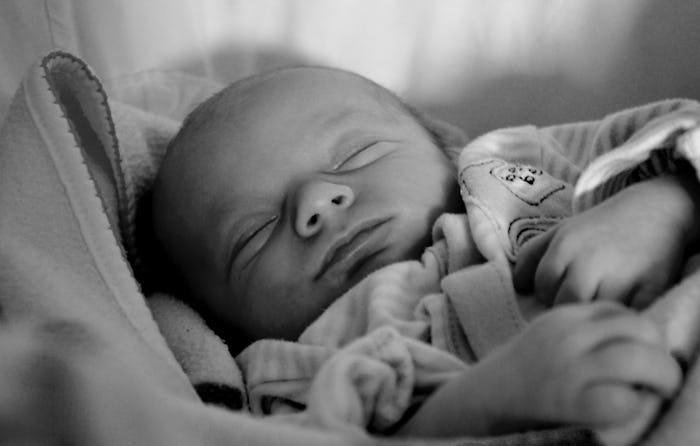Everything is going fine, and your baby has fallen into a sleep groove. You start to feel more rested, more rejuvenated, more normal. But just when you think you turned a corner, boom — sleep regression happens. Suddenly your baby is up every other hour either crying or just alert and ready to play. Although this is something your baby (and consequently you) have to go through, you may be wondering how to deal with nine month sleep regression.
The nine month sleep regression doesn't always happen right at nine months. The Baby Sleep site explained that the regression is usually anywhere between eight or ten months. During this time a baby is going through all sorts of physical and emotional changes. They're learning how to walk, how to play, and how to communicate. And, as the same site noted practicing developmental milestones at the wrong times, leading to the sleep regression. At 10 months old, my younger daughter loved to stand straight up in her crib at 1 a.m. And when she got bored of doing it in the dark, she'd scream. I'd often find myself going through the mental checklist of things that could be wrong: teething, sickness, dirty diaper, etc. in order to rule out any red flags to something potentially more serious, or something that I could actually fix. I felt helpless.
Once my baby went back to sleeping normally, I realized she was simply going through a phase. I also, unfortunately, realized there's nothing you can really do to stop sleep regression. There are, however, ways you can lessen the blow and prevent long term sleep issues from arising. Pediatric sleep consultants Wee Bee Dreaming suggested keeping the room as dark as possible and maybe even investing in room darkening shades. That way the baby can't be visually stimulated by anything and will hopefully get so bored they fall asleep, even if they wake briefly. If you go into their room, don't do what I did and turn on all of the lights. Try to keep it as calming and boring as possible. Indulging your baby in play time (like my husband did) would probably be a bad idea too.
Another way to regulate the regression a little better is paying close attention to your child's napping habits. Sleep patterns change as your baby grows and the same number of naps that worked at four months, will likely be different at nine months. The same sleep consultant website noted that at around eight months the third cat nap should be eliminated if it hasn't been already. This is especially true if your child seems to have a hard time falling asleep 50 percent of the time or is clocking less than eleven hours of sleep at night. Of course, the key is to do nap transitions slow and steady by adding or eliminating minutes in small increments so as to not cause a sleep regression or make a current one worse.
Lastly, as hard as it may be to see the light at the end of the sleepless nights tunnel, you (and your baby) will get more sleep eventually. If you remain consistent and flexible, sleep regressions will pass fairly quickly without the formation of any new sleep issues or problems, according to sleeping coach and author, Kim West's (AKA "The Sleep Lady") website. She says sleep regressions are a normal part of infant development and milestones. And while it's almost impossible to stay positive about lack of sleep or disturbances in sleep, just know that if your child isn't sick, they're growing. And growing is very good thing, something worth losing a little sleep over.
